介词讲义
- 格式:doc
- 大小:47.00 KB
- 文档页数:2
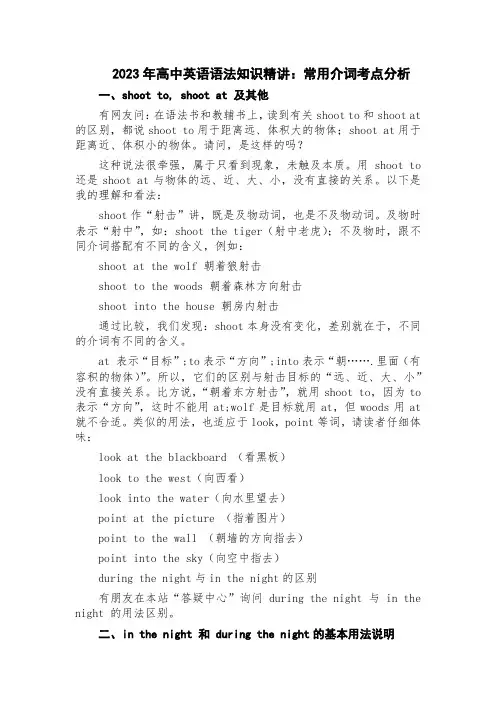
2023年高中英语语法知识精讲:常用介词考点分析一、shoot to, shoot at 及其他有网友问:在语法书和教辅书上,读到有关shoot to和shoot at 的区别,都说shoot to用于距离远、体积大的物体;shoot at用于距离近、体积小的物体。
请问,是这样的吗?这种说法很牵强,属于只看到现象,未触及本质。
用shoot to 还是shoot at与物体的远、近、大、小,没有直接的关系。
以下是我的理解和看法:shoot作“射击”讲,既是及物动词,也是不及物动词。
及物时表示“射中”,如:shoot the tiger(射中老虎);不及物时,跟不同介词搭配有不同的含义,例如:shoot at the wolf 朝着狼射击shoot to the woods 朝着森林方向射击shoot into the house 朝房内射击通过比较,我们发现:shoot本身没有变化,差别就在于,不同的介词有不同的含义。
at 表示“目标”;to表示“方向”;into表示“朝…….里面(有容积的物体)”。
所以,它们的区别与射击目标的“远、近、大、小”没有直接关系。
比方说,“朝着东方射击”,就用shoot to,因为to 表示“方向”,这时不能用at;wolf是目标就用at,但woods用at 就不合适。
类似的用法,也适应于look,point等词,请读者仔细体味:look at the blackboard (看黑板)look to the west(向西看)look into the water(向水里望去)point at the picture (指着图片)point to the wall (朝墙的方向指去)point into the sky(向空中指去)during the night与in the night的区别有朋友在本站“答疑中心”询问 during the night 与 in the night 的用法区别。
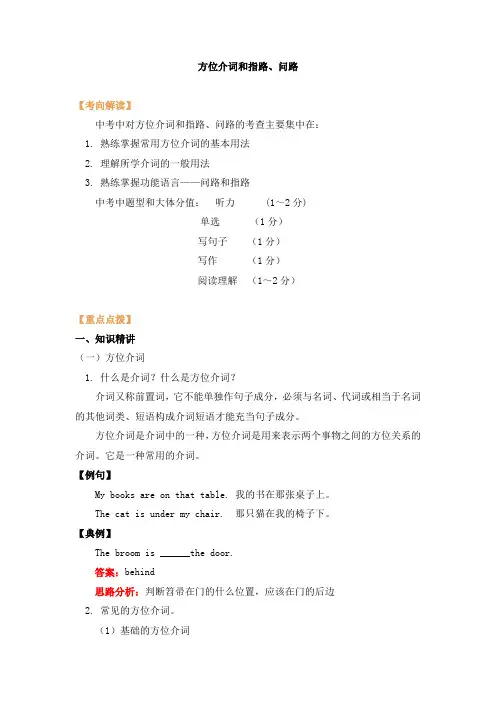
方位介词和指路、问路【考向解读】中考中对方位介词和指路、问路的考查主要集中在:1. 熟练掌握常用方位介词的基本用法2. 理解所学介词的一般用法3. 熟练掌握功能语言——问路和指路中考中题型和大体分值:听力 (1~2分)单选(1分)写句子(1分)写作(1分)阅读理解(1~2分)【重点点拨】一、知识精讲(一)方位介词1. 什么是介词?什么是方位介词?介词又称前置词,它不能单独作句子成分,必须与名词、代词或相当于名词的其他词类、短语构成介词短语才能充当句子成分。
方位介词是介词中的一种,方位介词是用来表示两个事物之间的方位关系的介词。
它是一种常用的介词。
【例句】My books are on that table. 我的书在那张桌子上。
The cat is under my chair. 那只猫在我的椅子下。
【典例】The broom is ______the door.答案:behind思路分析:判断笤帚在门的什么位置,应该在门的后边2. 常见的方位介词。
(1)基础的方位介词方位介词意思和用法例句on 表示在某物的上面,指与某物体相接触。
The picture is on the wall. 那张图片挂在墙上。
under 表示在某物垂直的正下方,两者之间不接触The book is under the desk. 那本书在桌子下。
behind 表示在某物的后面There is a tree behind thehouse.房子后面有棵树。
in 表示在场所、地点或位置里,意为“在……之内”、“在……里面”Your pencil is in the pencil-box.你的铅笔在铅笔盒里。
In front of 表示“在……的前面”,与 behind恰好相反My brother stands in front of mymother.我弟弟站在我妈妈的前面。
near 表示在某物的附近,意为“接近,靠近”Our school is near the lake. 我们的学校位于湖畔。
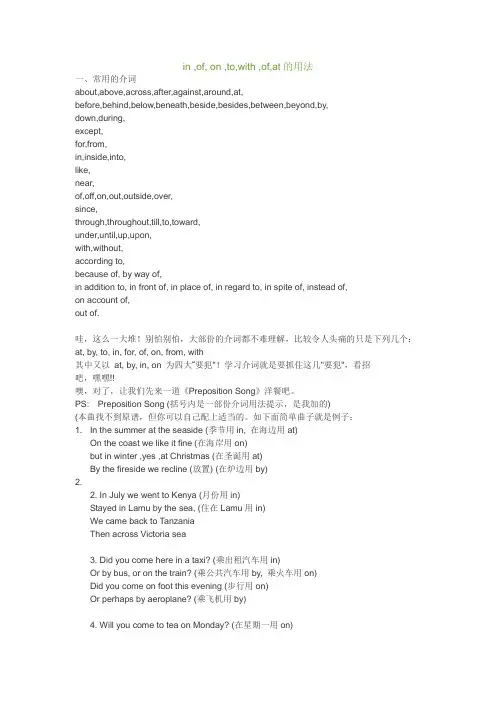
in ,of, on ,to,with ,of,at的用法一、常用的介词about,above,across,after,against,around,at,before,behind,below,beneath,beside,besides,between,beyond,by,down,during,except,for,from,in,inside,into,like,near,of,off,on,out,outside,over,since,through,throughout,till,to,toward,under,until,up,upon,with,without,according to,because of, by way of,in addition to, in front of, in place of, in regard to, in spite of, instead of,on account of,out of.哇,这么一大堆!别怕别怕,大部份的介词都不难理解,比较令人头痛的只是下列几个:at, by, to, in, for, of, on, from, with其中又以at, by, in, on 为四大“要犯"!学习介词就是要抓住这几"要犯",看招吧,嘿嘿!!噢,对了,让我们先来一道《Preposition Song》洋餐吧。
PS: Preposition Song (括号内是一部份介词用法提示,是我加的)(本曲找不到原谱,但你可以自己配上适当的。
如下面简单曲子就是例子:1. In the summer at the seaside (季节用in, 在海边用at)On the coast we like it fine (在海岸用on)but in winter ,yes ,at Christmas (在圣诞用at)By the fireside we recline (放置) (在炉边用by)2.2. In July we went to Kenya (月份用in)Stayed in Lamu by the sea, (住在Lamu用in)We came back to TanzaniaThen across Victoria sea3. Did you come here in a taxi? (乘出租汽车用in)Or by bus, or on the train? (乘公共汽车用by, 乘火车用on)Did you come on foot this evening (步行用on)Or perhaps by aeroplane? (乘飞机用by)4. Will you come to tea on Monday? (在星期一用on)I′ll be home at half past three (时间三点半用at)Yes, I′ll stay for half an hour (长达半小时用for)if you buy some beer for me (给我for me)5. In the morning I drink coffee (早晨用in the morning)In the afternoon there′s tea (下午用in the afternoon)In the evening I have cocoa (傍晚用in the evening)Yes, at night ,it′s good for me. (晚上用at night)6. Where′s my pencil?In the kitchen (厨房里in the kitchen)On the table near the chair (在桌上on the table, 在椅边near the chair)Underneath the cup and saucer (在杯和碟的下面underneath...)Just behind the teapot there (在茶壶后边behind...)7. Can you tell me how to get toMr. Johnson′s coffee-bar?Down the street and round the corner (down the street 沿着街道,round...绕过) Past the church and there you are8. Where′s the bookshop? Over there,dear (over there 那里)First turn left,then go straight on,Along the road,across the market (沿着路along the road, 穿过市场across...) It′s in front of you, dear John (在你前面in front of you)9. There is nothing on the radio (广播on the radio)"Songs with orchestra" they said. (with后orchestra为有形物,无形物则用by) I′m not interested in music (interested in 兴趣于)so I think I′ll go to bed10. In a moment I′ll be finished (in a moment 片刻里)With these prepositions-soI will say to you in Englishtill the next time, cheerio (加油呀) (till... 直到)怎样?唱完十段歌词,你就学到许多介词用法喽。
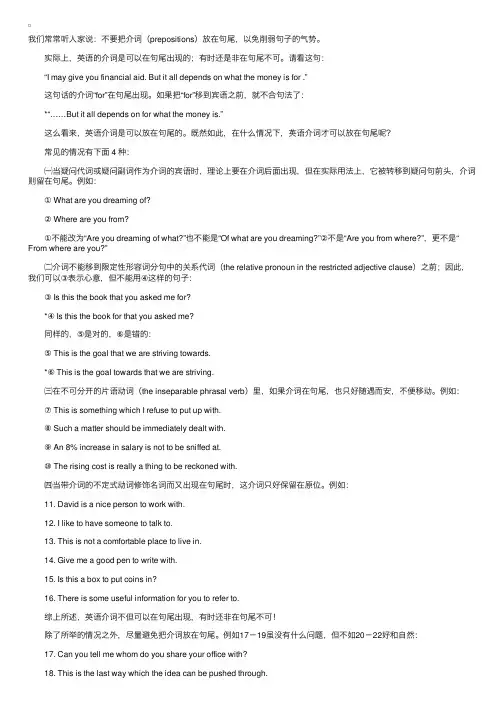
我们常常听⼈家说:不要把介词(prepositions)放在句尾,以免削弱句⼦的⽓势。
实际上,英语的介词是可以在句尾出现的;有时还是⾮在句尾不可。
请看这句: “I may give you financial aid. But it all depends on what the money is for .” 这句话的介词“for”在句尾出现。
如果把“for”移到宾语之前,就不合句法了: *“……But it all depends on for what the money is.” 这么看来,英语介词是可以放在句尾的。
既然如此,在什么情况下,英语介词才可以放在句尾呢? 常见的情况有下⾯ 4 种: ㈠当疑问代词或疑问副词作为介词的宾语时,理论上要在介词后⾯出现,但在实际⽤法上,它被转移到疑问句前头,介词则留在句尾。
例如: ① What are you dreaming of? ② Where are you from? ①不能改为“Are you dreaming of what?”也不能是“Of what are you dreaming?”②不是“Are you from where?”,更不是“From where are you?” ㈡介词不能移到限定性形容词分句中的关系代词(the relative pronoun in the restricted adjective clause)之前;因此,我们可以③表⽰⼼意,但不能⽤④这样的句⼦: ③ Is this the book that you asked me for? *④ Is this the book for that you asked me? 同样的,⑤是对的,⑥是错的: ⑤ This is the goal that we are striving towards. *⑥ This is the goal towards that we are striving. ㈢在不可分开的⽚语动词(the inseparable phrasal verb)⾥,如果介词在句尾,也只好随遇⽽安,不便移动。
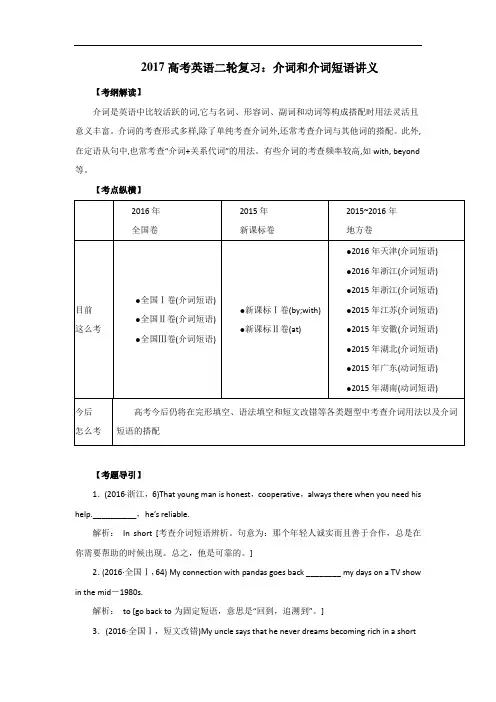
2017高考英语二轮复习:介词和介词短语讲义【考纲解读】介词是英语中比较活跃的词,它与名词、形容词、副词和动词等构成搭配时用法灵活且意义丰富。
介词的考查形式多样,除了单纯考查介词外,还常考查介词与其他词的搭配。
此外,在定语从句中,也常考查“介词+关系代词”的用法。
有些介词的考查频率较高,如with, beyond 等。
【考点纵横】【考题导引】1.(2016·浙江,6)That young man is honest,cooperative,always there when you need his help.__________,he’s reliable.解析:In short [考查介词短语辨析。
句意为:那个年轻人诚实而且善于合作,总是在你需要帮助的时候出现。
总之,他是可靠的。
]2.(2016·全国Ⅰ,64) My connection with pandas goes back ________ my days on a TV show in the mid-1980s.解析:to [go back to为固定短语,意思是“回到,追溯到”。
]3.(2016·全国Ⅰ,短文改错)My uncle says that he never dreams becoming rich in a shortperiod of time.________解析:在dreams之后加上of或about [固定短语dream of/about (doing) sth的意思是“梦想做某事”。
]4.(2016·全国Ⅱ,44)Most of us are more focused________our tasks in the morning than we are later in the day.解析:on [考查介词的用法。
很多人早晨的注意力要比晚些时候的注意力更集中。
固定短语be focused on专心于,集中于。
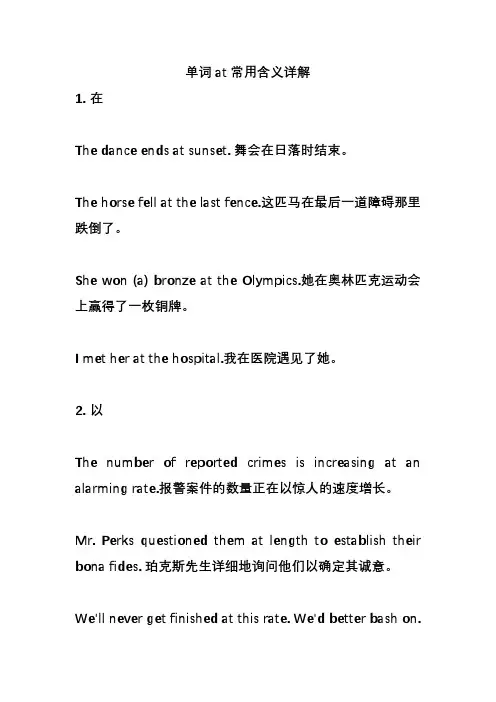
单词at常用含义详解1.在The dance ends at sunset. 舞会在日落时结束。
The horse fell at the last fence.这匹马在最后一道障碍那里跌倒了。
She won (a) bronze at the Olympics.她在奥林匹克运动会上赢得了一枚铜牌。
I met her at the hospital.我在医院遇见了她。
2.以The number of reported crimes is increasing at an alarming rate.报警案件的数量正在以惊人的速度增长。
Mr. Perks questioned them at length to establish their bona fides. 珀克斯先生详细地询问他们以确定其诚意。
We'll never get finished at this rate. We'd better bash on.以这种速度我们永远也完成不了。
我们最好加把劲。
3.于In all but the remotest regions of the empire, Roman pottery of a high standard is common at the sites of humble villages and isolated farmsteads.除了帝国最偏远的地区外,高水准的罗马陶器普遍存在于简陋的村庄和偏僻的农庄。
We decided to interrupt our usual mode of continuously scanning the entire sky, and instead repointed the spacecraft to stare right at this galaxy for the next few days.我们决定暂停我们通常采用的连续扫描整个天空的模式,将航天器重新定向,使其在接下来的几天里向右注视于这个星系。
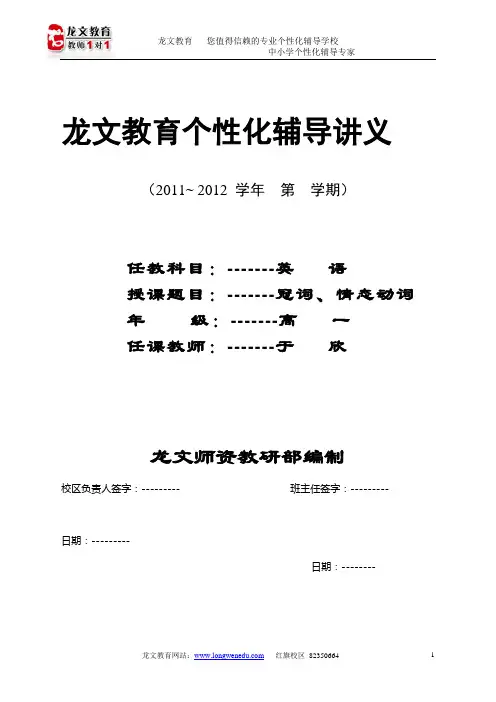
龙文教育个性化辅导讲义(2011~ 2012 学年第学期)任教科目:-------英语授课题目:-------冠词、情态动词年级:-------高一任课教师:-------于欣龙文师资教研部编制校区负责人签字:--------- 班主任签字:--------- 日期:---------日期:--------教研总部负责人签字--------教育是一项良心工程龙文个性化辅导教案授课教师于欣授课对象丁语轩授课时间2012.1.7 授课题目冠词、情态动词课型语法使用教具书,练习书冠词、和情态动词是高考中的必考常考点,所以要熟练掌握教学目标教学重点和难点各个情态动词的用法区别,以及冠词的使用参考教材语法书,高考复习书不定冠词的基本用法1. 代表一类人或事物Even a child can answer this question.A horse is a useful animalA grammar book is necessary to a learner.2.用在专有名词前,表示‖一个叫作。
的人‖ 或―像…那样的人‖A Mr wang is waiting for youHow I wish to become a Yang Liwei.3.表示“每一”,相当于per ,用于表示时间、重量、长度等单位前。
we work eight hours a day.Two yuan a kilo.4.用在‖of/at+a+名词‖结构中,表示‖同一‖ ,相当于the sameWe are just of an age.Birds of a feather flock together 物以类聚Don‖t speak together,one at a time.5.当物质名词具体化,表示一类一阵一份等意思时。
Green tea is a wonderful tea.This is a good coffe.6.用于抽象名词前,表示‖一种…的行为‖。
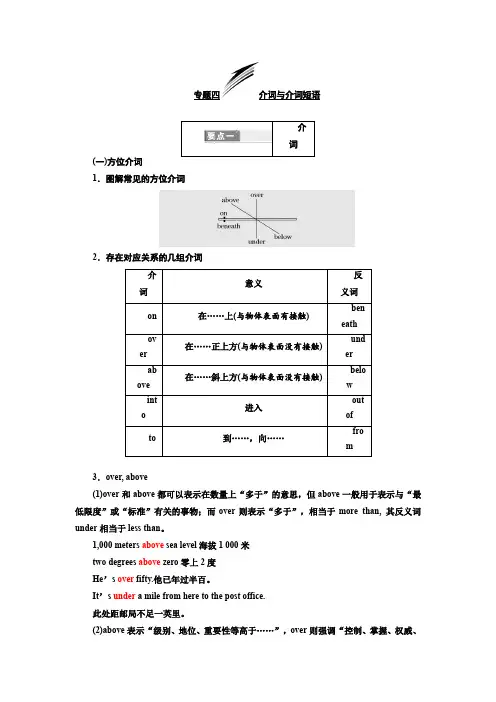
专题四介词与介词短语(一)方位介词1.图解常见的方位介词2.存在对应关系的几组介词3.over, above(1)over和above都可以表示在数量上“多于”的意思,但above一般用于表示与“最低限度”或“标准”有关的事物;而over则表示“多于”,相当于more than, 其反义词under相当于less than。
1,000 meters above sea level海拔1 000米two degrees above zero零上2度He’s over fifty.他已年过半百。
It’s under a mile from here to the post office.此处距邮局不足一英里。
(2)above表示“级别、地位、重要性等高于……”,over则强调“控制、掌握、权威、优越”等。
He always puts his students above everything.他总是把自己的学生放在一切事情之上。
He has little control over his emotions.他控制不住自己的感情。
4.along, through, across, over5.at, on, to, in6.between, among(1)between在……之间(指两者),常和and连用。
The building stands between the park and the small river.那栋楼位于公园和小河之间。
(2)among在……之间(指三者或三者以上)。
We’ll visit a town among the mountains.我们将要参观一个被群山环绕的小镇。
[名师指津]如果指三个及三个以上的人或物中的每两个之间,仍然要用between。
Switzerland lies between France, Italy, Austria and Germany.瑞士位于法国、意大利、奥地利和德国之间。
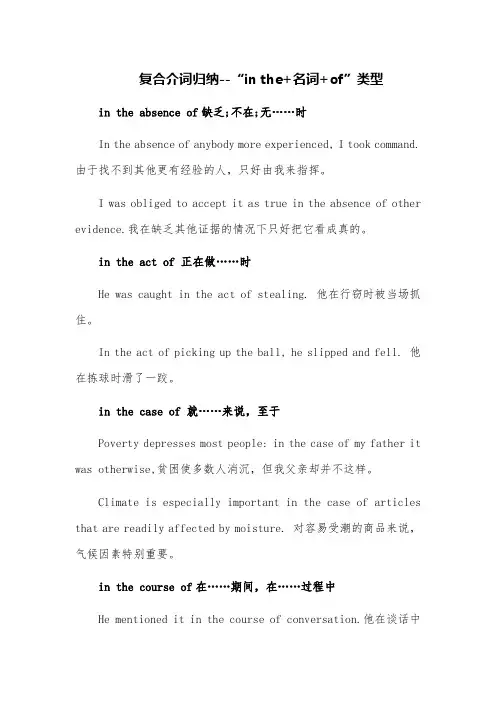
复合介词归纳--“in the+名词+of”类型in the absence of缺乏;不在;无……时In the absence of anybody more experienced, I took command.由于找不到其他更有经验的人,只好由我来指挥。
I was obliged to accept it as true in the absence of other evidence.我在缺乏其他证据的情况下只好把它看成真的。
in the act of 正在做……时He was caught in the act of stealing. 他在行窃时被当场抓住。
In the act of picking up the ball, he slipped and fell. 他在拣球时滑了一跤。
in the case of 就……来说,至于Poverty depresses most people: in the case of my father it was otherwise,贫困使多数人消沉,但我父亲却并不这样。
Climate is especially important in the case of articles that are readily affected by moisture. 对容易受潮的商品来说,气候因素特别重要。
in the course of在……期间,在……过程中He mentioned it in the course of conversation.他在谈话中提及那事。
In the course of the discussion many constructive opinions were heard.在讨论当中,听到了很多具有建设性的意见。
in the direction of 朝……方向A woman was seen running in the direction of the station.有人看见一名女子朝着车站的方向奔去。
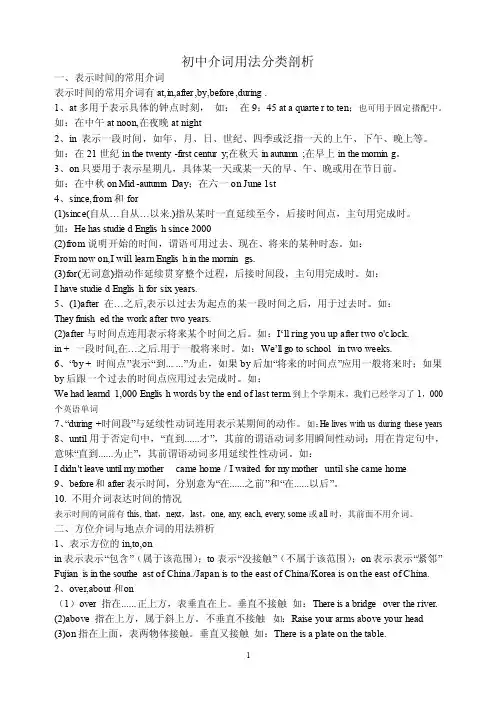
初中介词用法分类剖析一、表示时间的常用介词表示时间的常用介词有at,in,after,by,before,during.1、at多用于表示具体的钟点时刻,如:在9:45 at a quarter to ten;也可用于固定搭配中。
如:在中午at noon,在夜晚at night2、in 表示一段时间,如年、月、日、世纪、四季或泛指一天的上午、下午、晚上等。
如:在21世纪in the twenty-first century;在秋天in autumn;在早上in the morning。
3、on只要用于表示星期几,具体某一天或某一天的早、午、晚或用在节日前。
如:在中秋on Mid-autumnDay;在六一on June 1st4、since,from和fo r(1)since(自从…自从…以来.)指从某时一直延续至今,后接时间点,主句用完成时。
如:He has studied English since 2000(2)from说明开始的时间,谓语可用过去、现在、将来的某种时态。
如:From now on,I will learn English in the morning s.(3)for(无词意)指动作延续贯穿整个过程,后接时间段,主句用完成时。
如:I have studied English for six years.5、(1)after 在…之后,表示以过去为起点的某一段时间之后,用于过去时。
如:They finishe d the work after two years.(2)after与时间点连用表示将来某个时间之后。
如:I…llringyouupaftertwoo'c lock.in + 一段时间,在…之后.用于一般将来时。
如:We‟llgotoschoolin two weeks.6、“by+时间点”表示“到......”为止,如果by后加“将来的时间点”应用一般将来时;如果by后跟一个过去的时间点应用过去完成时。
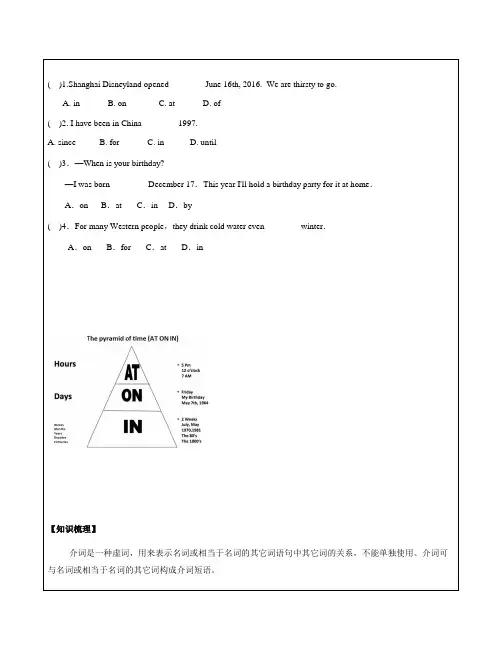
( )1.Shanghai Disneyland opened ________June 16th, 2016. We are thirsty to go.A. inB. onC. atD. of( )2. I have been in China ________1997.A. sinceB. forC. inD. until( )3.—When is your birthday?—I was born ________ December 17.This year I'll hold a birthday party for it at home.A.on B.at C.in D.by( )4.For many Western people,they drink cold water even ________winter.A.on B.for C.at D.in【知识梳理】介词是一种虚词,用来表示名词或相当于名词的其它词语句中其它词的关系,不能单独使用。
介词可与名词或相当于名词的其它词构成介词短语。
A.fromB. onC. to( )12.What do you have _____Monday ?A. inB. onC. at( )13.He wants to buy a car ______ himself.A. atB. onC. for( )14.She buy a ca rd ______ me.A .on B. to C. for( )15.Mocky had a birth day gift Ken.A onB inC for( )16.Are you going to take part ________ the meeting?[来源:Z,xx,] A. on B. at C. in( )17.Please send an email _____me.A.toB.forC.on( )18.Is your home far ________ the school?A. atB. inC. from( )19.What can they do________ the party ?A. onB. withC. for( )20.Welcome________my home.A.to B.too C.two( )21.The hospital is next____the museum。
中考英语语法表示场所、方向的介词得以讲义及总结与整理①表示场所的介词:at,in,on,under,by,near,between,around,opposite等②表示方向的介词:into,out of,along,across,through,up,down,past等1.at,inA.at:在某地点(表示比较狭窄的场所)at the school gate在学校门口at 2 Baker Street在贝克街2号at home在家at the door在门边at a factory在一家工厂at the bottom of在……下面/底部at the party在聚会上at the back of在……后边at the end of在……末尾at the head of在……排头at Mike’s house在迈克家at the crossroads在十字路口at the hotel在宾馆at the bus stop在公共汽车站at the airport在机场at my desk在我的书桌旁I’ll meet him at the Beijing railway station.(我将去北京站接他。
)B.in:在某地(表示比较宽敞的场所)in Beijing在北京in the world在世界上in China在中国in the street在街上in the yard在院子里in a room在房间里in the middle在中部in the house在房子里in the air在空中in the newspaper在报纸上in the photo在照片里in the picture在图画里in a queue排队in the open air在户外Hong Kong is a very crowded city inthe south of China.(香港是中国南方一个非常拥挤的城市。
小升初语法讲解 介词(方位介词) 专题训练(讲义)人教PEP 版 英语六年级下册知识点讲解方位介词本课我们重点学习几组容易混淆的地点介词。
1. on, over, above两者都表示“在...上面”,介词on 的两者有接触; over 表示“在...正上方”,两者不接触,强调垂直上方; above 指“在……之上”指相对高度,不一定是正上方,其反义词是below 。
The apple is on the table. 苹果在桌子上。
The lamp hung over the table. 。
The plane flew above the clouds.2. below, under(1)below 表示“在下方或位置低于……”,不一定有“垂直在下”之意 The temperature will fall below zero tomorrow.(2)under 表示“在……正下方”There are many bikes under the trees.3. in, at, on前面我们学了in, on, at 作为时间介词时,根据后街时间长短排序为in >on >at, 同样,in 和at 作为地点介词时,从后接范围大小看仍然符合in >at 。
in +大地点, at +小地点They will arrive in Pairs in a few hours. 几小时后他们到达巴黎。
They will arrive at the train station soon. 他们很快将到达火车站。
✩ 特殊的地点介词用法:on the farm 在农场, in the hotel 在旅店4. between, amongbetween 和 among 都表示“在...之间”,between 表示“在两者之间”,among 表示“在三者或三者以上之间”。
I have to finish my homework between 7 and 9.我们必须在7点到9点之间完成家庭作业。
表解语法:冠词,连词,介词,冠词距离高考还有一段时间,不少有经验的老师都会提醒考生,愈是临近高考,能否咬紧牙关、学会自我调节,态度是否主动积极,安排是否科学合理,能不能保持良好的心态、以饱满的情绪迎接挑战,其效果往往大不一样。
以下是本人从事10多年教学经验总结出的以下学习资料,希望可以帮助大家提高答题的正确率,希望对你有所帮助,有志者事竟成!养成良好的答题习惯,是决定高考英语成败的决定性因素之一。
做题前,要认真阅读题目要求、题干和选项,并对答案内容作出合理预测;答题时,切忌跟着感觉走,最好按照题目序号来做,不会的或存在疑问的,要做好标记,要善于发现,找到题目的题眼所在,规范答题,书写工整;答题完毕时,要认真检查,查漏补缺,纠正错误。
总之,在最后的复习阶段,学生们不要加大练习量。
在这个时候,学生要尽快找到适合自己的答题方式,最重要的是以平常心去面对考试。
英语最后的复习要树立信心,考试的时候遇到难题要想“别人也难”,遇到容易的则要想“细心审题”。
越到最后,考生越要回归基础,单词最好再梳理一遍,这样有利于提高阅读理解的效率。
另附高三复习方法。
英语中有a,an,和the这三个冠词, a/an为不定冠词, the是定冠词。
有时名词前不用冠词称为零冠词。
冠词是一种虚词, 不能单独作句子成分, 只能放在名词前面, 帮助说明这个名词的含义。
一、冠词的类别和最基本用法二、不定冠词的使用场合三、定冠词的使用场合四、不用冠词(零冠词)的情况五、冠词的位置六、差之一冠, 意差千里有些词组中, 有无冠词, 意义相处很多, 甚至相反, 常见的词组有:连词连词是连接单词短语或句子的一种虚词, 在句子中不单独作句子成分,一般不重读,按照性质分并列连词和从属连词.一、连词的分类及使用二、几组常用连词的比较三、几组较为特殊的连词:第五章介词介词是一种虚词, 不能重读, 也不能单独作句子成分, 通常用于名词或相当于名词的词及代词前, 表示其后的词语与句中其他词之间的关系。
where和how的用法及练习1.where询问什么地方。
如:- Where are you?你在哪儿?- I'm at home.我在家。
- Where do you live?你住在哪儿?- I live in Shanghai.我住在上海。
2.how是特殊疑问句中本领最大的疑问词,具体用法如下:(1)表示(方式、方法)怎样,怎么- How do you go to school?你怎么去学校的?(交通方式)-I go to school by bike. 我乘自行车去学校。
- How does she study English?她是怎样学习英语的?(方式)- Listen more,read more,write more. 多听,多读,多写。
(2)指健康等情况- How is Miss Zhang?张小姐身体好吗?- She's fine.她很好。
- How are you?你身体如何?- I'm fine.我很好。
- How do you feel?你感觉怎么样?-I feel ill.我觉得生病了。
(3)询问天气情况- How is the weather in Beijing? 北京的天气怎样?同义句:What's the weather like in Beijing?(4)指数量、程度多少,后接其它形容词或副词,可以构成各类疑问词- How many students are there in your class? 你班里有多少学生?- Twenty.二十人。
(how many多少)- How long will you stay here? 你要在这儿呆多久?-A week.一周。
(how long多久)- How often do you go to a movie?你多久看一次电影?- Twice a week。
一周两次。
(how often多久一次)- How far is your home from the library? 你家离图书馆有多远?-A kilometer. 一公里。
一介词和介词短语介词和介词短语的核心考点介词是虚词,不能单独作句子成分,必须与名词、代词(或相当于名词的其他词类、短语或从句等)构成介词短语,在句中充当一个成分。
介词分为:简单介词,如at,in,for 等;合成介词,如within,inside,onto,throughout等;短语介词,如according to,out of,because of,by means of,in spite of,instead of等;双重介词,如from behind/above/under,until after等;分词介词,如considering,including,judging (from/by) 等。
1.介词搭配(1)“动词+介词”搭配:注意特定搭配与同一介词与多个动词搭配意义不同的情况。
①rob sb. of sth. /clear the road of snow(表示“夺去、除去”意义的动词与of 连用)②supply us with food/fill the glass with wine(表示“供给”意义的动词与with 连用)③make a desk of wood/mak e bread from flour/make the material into a coat(表示“制作、制造”意义的动词与of,from,into连用)④介词+the+部位与动词的关系(=动词+sb. ’s+部位,可换用)strike him on the head(表示“击;拍;碰;摸”意义的动词与on连用)catch him by the arm(表示“抓;拉;拿;扯”意义的动词与by连用)hit the boy in the face(表示“肚;胸;眼;脸”等人体前部的器官名词与in连用)⑤prevent(stop,keep)sb. from doing sth. (表示“阻止,禁止”意义的动词与from 连用)⑥persuade(advise,warn)sb. into doing sth. (表示“说服;建议;警告”意义的动词与into连用)⑦buy(leave,get,win,gain,lose) sth. for sb. (表示“得失”意义的动词与for 连用)⑧tell(show,teach,sing,write,read) sth. to sb. (表示“告知”意义的动词与to连用)⑨give(allow,promise,pass,hand) sth. to sb. (表示“授予”意义的动词与to 连用)注意:⑦⑧⑨可换成buy sb. sth. ,tell sb. sth. ,give sb. sth. 双宾结构。
介词常见介词的活用(by,with,against,over,on,in,at,besides,for)1.over可表位置,意为“在……上方,越过;遮住,盖住”,也可表时间,意为“在……期间,(多年)以来”等,它还有“在……(问题)上,对(某事)”等引申意义。
如:①Y0u can’t wear a blue jacket over that shirt—it’ll look terrible.你不能在那件衬衣外面再穿上蓝色的夹克——太难看了。
②We had a pleasant chat over a cup of tea.我们一边喝茶一边愉快地交谈。
③We heard it over the radio.我们从广播中听到了它。
2.by的主要意思有“在……旁,靠近;乘(车、船等);不迟于;到……为止;被,由;根据,按照(关系);通过……方式”等,还可以用来表示增加或减少的程度。
by构成的常见短语有:by and by不久,迟早by and large大体上by oneself单独by the way顺便说说by far……得多,最…… by chance碰by accident偶然地by means of借助by no means绝不,一点也不by mistake错误地①The water in the river rose by two meters.②He is an Englishman by birth.他在血统上是英国人。
3.with可以用来表示“带有,拥有;随着;就……来说;用,以;和,与;对于,关于”等意思。
with还可用来表示原因。
如:①He turned red with anger.他气得脸变红了。
②The problem with looking into space from the earth is that there is a lot of dust in the earth’s air.从地球上观察太空存在一个问题,就是地球的大气中有大量的尘埃。
4.beyond这个词同学们平时接触的机会不是太多,但它却是一个考查热点。
beyond表示“(时间)过了,比……晚,迟于;(位置)在……那边,超出……之外;(范围)超过,为……所不及,超出……的范围”等意思。
如:①They arrived b eyond nine o’clock.他们过了9:00才到。
②The book is beyond me.这本书我看不懂。
③Tom is far beyond his elder brother in maths.汤姆的数学比他哥哥的好多了。
高考主要考查学生对固定短语的掌握程度、对短语意义的了解以及介词在这些固定搭配中的应用。
1.名词词组:on the contrary相反;in turn依次;in one’s opinion根据某人的看法;off time准时;out of reach 够不着2.动词词组:remind sb of sth提醒某人某事;rob sb of sth抢劫某人的…;result from由…引起;call at访问3.形容词词组:be curious about对……好奇;be proud of因……而自豪;be popular with受到……的欢迎4.介词短语:apart from除……Pb;in addition to除……之外(还);because of因为;instead of代替;in fear of 为……提心吊胆;for fear of以免;in case of防备;thanks to由于;in the middle of在……中间;according to根据;in front of在……前面;in return for作为对……的回报;in charge of负责;as a result of作为……的结果;in exchange for与……交换等核心介词用法归纳与辨析1.表示时间的介词in的用法如下。
表示在某一较长时间内,如世纪、年、月、季、周等一般用介词in,如:in the 1990s,in January, in(the)winterin和during表一段时间内两词可互用。
如:in the night, during the night, in the war, during the war。
但略有区别:当接表示“活动”的抽象名词时多用during,接“活动”的动名词及短语时用in。
如:during the discussion/in discussing the problem during her stay in Hubei/in playing basketball/during the course of/in digging the tunnel2.在具体的某一天或某天上午、晚上、前夕,常用on。
3.表示某一时刻或某一点时间用at,如小时、分钟等。
有些时间名词前有one,each,any,every,some,all,next,last,that修饰时,不接介词。
如:that day,next Sunday some day,one day4.till、until、to的用法。
(1)till(until)与持续动词连用一般用于肯定句中,与短暂动词连用一般用在否定句中。
如:He waited for me till twelve o’clock.He didn’t get up till (until) 10 a.m.(不可用to)但注意:在句首出现或强调句型中一般不用till而用。
如:Not until 9 a.m.did Mr.Smith come back to school.(2) to表“终结”时常和from连用,但要注意不与from连用时的意义。
如:from July to September, from six to (till) eight(从……到……为止),但from morning till night(从早到晚),不能用to。
-1-5.表示方式、手段、工具的介词(1)by the year/hour/day按年/小时/天,但to the pound按磅算,to the ton按吨计。
(2)表泛指的方式、手段:by post,by telephone(radio),但on the phone/on the radio/on TV(电讯器材),by electricity,by hard work,learn sth.by heart,through the satellite,through practice,through his own efforts,through experience,through the telescope(3)交通工具类。
另外:by means of 用……方法,by way of 经由,取道于,用……方法;with the help(permission)of sb./with sb.’s help(permission)“在……帮助下”。
(4)表方式、手段的其他用法。
He beat the dog with a whip.(with+工具、机器)One smells with his nose.(with+人体器官,但by hand“手工,用手”)He stood up with pride.(with+情绪、情感、态度的名词)注意:使用语言、材料、文字等用in。
如in English (ink, pencil)。
另外如:in high (good, low) spirits, in anger, in joy, in comfort, in sorrow, in safety, in danger, in need, in debt, in love, in fun, in pain, in tears, in surprise, in good(poor)health, in good order, in flower, in a way, in a low voice, in silence, in(with)satisfaction, in a hurry, in(with)words, live/feed on food, kneel on one’s knee, take/catch sb. by surprise(出其不意)6.表示“除……之外”的几组常用介词比较。
(1)besides “除……以外,(还有)”。
作副词时意思是“而且,更何况”。
如:It was too late to see a film,and besides,I was tired.(2)except“除去,除……之外(不再有)”。
如:We all went except John.在否定句中,两词可以换用,如:He has no other hats except/besides this one.(3)except for“除了……(对句子主题进行细节校正或附加说明)”后接名词、代词或what从句,此时与except that+句子意思相同。
如:He was very clever except for carelessness.(4) except that...“除了……一点以外”。
如:He has not changed except that he is wearing dark glasses.(5)but和except在表示“除了……以外”时可以通用,但应注意以下三点:前面有不定人词、疑问代词在意义上对称时,多用but。
All but one are here. Nobody but I likes making model ships.后接不定式短语为排除对象时,多用but。
He has nothing to do but wait.(前有do,后省to);but与一些固定结构连用。
have no choice but to do sth.只得做某事,can not but do sth.不得不,can not help but do sth.不得不……,but for...如不是……7.介词的省略:介词for表示时间的省略要求。
(1)以all开头的名词短语,for要省略。
如:I stayed with her all the morning.(2)否定句中,表示时间的短语前的for不能省略。
如:I haven’t seen you for thirty years.(3)时间状语在主句之前,for不能省略。